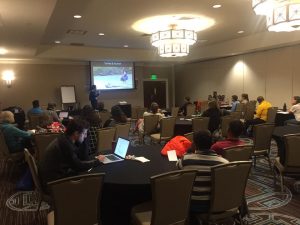On the networks side: RASTOMA

February 2019 – RASTOMA hosted a workshop on income-generating activities at the International Sea Turtle Symposium in Charleston, USA
On February 3, Alexandre Girard, President of the Network of Actors for the Conservation of Sea Turtles in Central Africa (RASTOMA), led a workshop on income-generating activities and livelihoods for communities involved in marine turtle conservation. This workshop took place during the 39th International Symposium dedicated to the Conservation of Sea Turtles (International Sea Turtle Symposium, ISTS). Through this initiative, 26 conservation project leaders from various regions of the world were able to share for half a day and produce useful resources for members of the RASTOMA network.
This was the second edition of the RASTOMA workshops at the ISTS. RASTOMA inaugurated this workshop concept bringing together actors from around the world last year, at the International Symposium held in Kobe, Japan, in 2018. The RASTOMA workshop was a great success and the room was quickly too small to accommodate all participants. This year in Charleston, South Carolina, we have had a bigger room. Another progress: we were able to film the presentations, which are now available online at rastoma.org.
The program was rich and diverse. After an introduction by Alexandre Girard (RASTOMA), Brad Nahil, leader and founder of « SEE Turtles », an organization that develops vision tourism in connection with marine turtle projects, presented the interest and the possibilities of development of tourist programs for the benefit of communities in connection with conservation projects. Tushan Kapurusinghe, director of the Sri Lanka Turtle Conservation Program (TCP Sri Lanka), then gave us a real two-part Master Class on diversification of livelihood and income-generating activities, drawing on his experience as a program director and describing the concrete actions and (many!) approaches he is developing with Sri Lankan communities. Sabine Berendse closed the workshop by presenting the initiative of Curacao program, which innovates by producing souvenirs for tourists and utilitarian objects for communities from plastic waste collected on the nesting beaches of the Caribbean island of Curacao.
The organization of this workshop is part of RASTOMA’s strategy to strengthen the capacity of its members in community-based approaches and income-generating activities related to marine and coastal conservation. To reach its goal, RASTOMA develop two parallel approaches: in our area of action in Central Africa, we list the actions developed by the NGO members of the network and we identify the factors of success and pitfalls to avoid, in order to make recommendations for members who wish to develop such activities to strengthen their community roots. In addition, we gather, through the international workshop organized at the ISTS, to capture the richness and diversity of approaches imagined by conservation stakeholders around the world. We are building a network of contacts and skills around the world, which we can mobilize at the request of RASTOMA members according to their needs.
The final product of our local and international approaches is to make available resources for the benefit of members on the rastoma.org website:
– the videos and slideshows of the workshop presentations which are sources of knowledge and information for members wishing to develop community approaches;
– A directory of community actions in place in Central Africa and around the world, supplemented by a directory of resource persons who have developed expertise in the field.
RASTOMA wishes to continue the experience next year by organizing a third workshop on community-based approaches to marine turtle conservation projects at the upcoming ISTS Symposium in Colombia.
For more informations
– RASTOMA’s website : http://www.rastoma.org/
– Presentation of the project lead by RASTOMA

